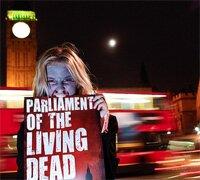Gordon Brown, Thatcherite?
Gordon Brown, Thatcherite? I wouldn’t dream of saying that myself, of course; it’s just too damn Dave Spart for me to get away with. Oh no, I’m simply quoting the succinct title of a chapter in Simon Jenkins’ recent book ‘Thatcher and Sons: a Revolution in Three Acts’.
Not being a particular fan of the man’s newspaper columns, I don’t know whether or not I’ll get round to buying a copy. But according to the synopsis, the central thesis is that Major, Blair and Brown essentially constitute the apostolic succession in terms of the Iron Lady’s project.
Summarising the charge sheet against Britain’s current prime minister, Jenkins reportedly rails against:
‘Brown’s unbridled enthusiasm for the privatisation of public services and public investment, his aversion to the public sector ethos in favour of private profit, his crushing of union power, his introduction of workfare into welfare and his patronage of money making above all other virtues’.
None of this a particularly controversial assessment for much of the far left. But coming from Sir Simon – former editor of The Times and all-purpose member of the great and the good – it hasn’t gone down well among New Labour supporters.
In a review for the Independent, the strongly Blairite journalist John Rentoul splutters:
This sub-Trotskyite argument, currently reaching its full flowering among Unison and assorted leftists denouncing the “privatisation” of the NHS, requires a wilful aversion to reality.
Sub-Trotskyite? But John, you are talking about a former chairman of English Heritage here, not some grubby little donkey-jacketed oik selling papers outside the supermarket of a Saturday morning. Have some respect.
But how ironic that the ‘Thatcherite’ jibe comes just months after Lord Turnbull branded Brown a Stalinist. Can’t the Establishment make up its mind?
Personally, whether or not to the use of the T-word for polemical purposes almost misses the point. What unites British prime ministers since 1979 – or more accurately, 1977 – is common adherence to neoliberalism; counteracting its ideological dominance is the challenge facing democratic socialists.
-------------------------
| Tweet |
Dave Osler is a regular contributor. He is a British journalist and author, ex-punk and ex-Trot. Also at: Dave's Part
· Other posts by Dave Osler
Filed under
Blog ,Labour party ,Trade Unions ,Westminster
12 responses in total ||
Brown – an intellectual pigmy rather than a giant – has unfortunately given us the worst of all worlds.
The NHS and education budgets have been saddled with the enormous extra costs of PFI – though handily that allows Brown to keep those liabilities off the public sector balance sheet and maintain his ludicrous fiscally “prudent” pretence – while their operating structures remain centrally controlled and hardly touched by desperately needed market discipline.
Needless to say, this is exactly the wrong way round!
“counteracting its ideological dominance is the challenge facing democratic socialists” – maybe so, though I thought this was a “liberal” site?!
Well, Jenkins is right in the sense that Thatcher established a political consensus which New Labour have not really sought to challenge. Broadly speaking, this consensus is that the management of the economy is to be based first and foremost on controlling inflation through restricting the money supply, and that classic Keynesianism, using borrowing to reflate the economy in times of recession, is no longer an adequate prescription for economic policy.
In terms of the role of the state, Blair and Brown have if anything proved to be uber-Thatcherites, extending the role of the private sector into areas which she only dreamed of. The concensus on this specific point, which might be summarised as “private good, public bad” has actually moved even further to the right during the New Labour years.
The other sense in which Blair and Brown constitute an apostolic succession from Thatcher is that both are avowed Atlanticists, as she was. In addition Brown, though not Blair, is a convinced Eurosceptic.
Andrew Marr also believes this. The conclusion of his History of Modern Britain was essentially that “we are all Thatcher’s children now.”
It is a bit ludicrous to declare ‘neo-liberal’ a PM like Blair who, with Brown as Chancellor, oversaw a massive increase in the size of the state as a proportion of GDP.
Public spending has risen – indeed in 2001 Labour promised tax rises as part of their election campaign (along with the lib dems also offering tax rises more than 60% of the vote went towards higher taxes).
Chris
You have missed the point of PFI for Labour – it is not about keeping debt off the balance sheet. Many people make this mistake as much of the critisism is rooted in anger about public ownership and so on.
PFI for Labour is in fact a party political tool.
In the past Labour got in, put up taxes, and spent public money on infrastructure projects and maintenance works – and then got voted out.
The Tories then came in and cut spending on infrastructure and maintenance (the least visible area of public spending) and thus cut taxes so as to stay popular.
Or at least that is how Labour saw it when they came in in 1997 to be confronted with leaking schools roofs and crumbling hospitals to fix because of spending cuts having eaten away at investment projects and maintenance.
So the PFI system was seen as a good way to overcome that cycle by entrenching infrastructure projects.
Basically it enabled Labour to do the investment they wanted without high initial costs, and tied it to legally enforcable maintenance contracts to ensure that when the tories next got in they couldn’t just slash maintenance of infrastructure to cut taxes.
As I say – this was party political thinking at its most strategic.
If the Tories win the next election they are basically tied by contract to Labour levels of maintenance work on things like hospitals and schools for the duration of their term in office.
“Basically it enabled Labour to do the investment they wanted without high initial costs”
Just incredibly high *lifetime* costs coupled with wholly inflexible contracts which leave school and hospital staff completely at the mercy of the contractors if they want to make any changes. Brilliant, eh?
Party political thinking at its most…idiotic.
No I think this is completely wrong. The point that Jenkins is making in his usual confused way is about centralisation- that Thatcher, Blair and Brown are all addicted to centralising power in their own hands and attempting to rule all by Ministerial fiat. The argument goes that they have all weakened local government- hence Rentoul’s Trotskyite jibe- in order to centralise power. Once centralised they have an amazing faith in businessmen and outside experts to run the centralised agencies- like say a National Health Service- but effectively what they don’t want is local solutions. In a sense that cuts across the lines of left and right- because both on the left and the right you would find elements against such an argument- but those elements have lost the political battles.
Its interesting to reflect ideologically that what Labour have accepted is not the competitive ethos of the market- but the idea that businessmen are better at running things that civil servants or politicians hence PFI hence private monopolies. The Tories too accepted that premise in power- whilst not being as keen on the market and competition- so for instance they did not create competition on the railways merely a set of private monopolies. Ideologically the statement is that private disciplines will transform the public sector- though some are moving towards the more classically liberal idea that competition might improve things.
Gracchi
if that is the case then Jenkins has misdiagnosed.
After all, surely that means Thatcher was just Wilsonian, and Wilson Churchilian, and Churchill and Atleeite.
Very very very few PMs in English history have been anything other than centralisers.
Margin4Error
Very good point. You could argue that Callaghan was in favour of devolution, but his decentralising credentials are slightly tarnished by the fact that he believed in incomes policy. And while Blair implemented Scottish and Welsh devolution and introduced regional development agencies, he did indeed weaken local government. All the other PMs of my lifetime have been out-and-out centralisers.
Paul
Except, so far, Gordon Brown.
In his very short time in charge the only thing he has really done to local authorities has been to reduce the number of public service agreements they are subjected to, and cut the amount of their money that is ring fenced.
That in itself can’t tip the balance of his premiership one way or another – but oddly its a decentralising move for councils that is without parallel under his predecessor, or thatcher. (though that might be harsh to thatcher as it was a long time ago and I can’t remember every detail).
M4E, I been wondering for a long time how the government justifies PFI. It’s always seemed to me that PFI just incurred extra expense and allowed consortiums to profit at the expense of the taxpayer. I have never read anything particularly convincing in it’s defense.
What you have said there is the first logical and convincing defence of PFI I have ever read. Thankyou.
Andreas
ah – political analysis doesn’t like logical and convincing explanations.
It is much easier and more fun to pretend it is about money, dodgy business connections, and keeping things hidden (when in fact it is all done in the open).
The Labour Party circa 1997 was in my opinion the most strategically well ordered, thoughtful, responsive, and frankly impressive political party machine there had been in any western democracy.
It’s dominance of media agenda, its clever manipulation of the opposition, and its long term thinking, had certainly never been seen in the UK before, and I know of no equivelent example elswehere.
When that is kept in mind it is much easier to understand New Labour policies that seemingly make little sense. Like PFI and PPP.
How can one understand the wreckage that Gordon creates from the sell-off of gold reserves at rock bottom to his permission to plunder the country’s assets by private consortia? Who is pulling his strings? Someone who holds his balls, someone who knows that he knew about the murder of David Kelly and the truth about 7/7.
He is a lame duck, complicit in destroying institutions that have served the country well: the NHS, the Armed Forces, the Police, Education, Science. Or is he serving another master?
Where is the leadership? Where is the example? Why should anyone keep the law whilst our representatives fill their boots and barely get a slap on the wrist for blatant corruption?
Please, If you are going to be selfserving and venal, why do it publically?
Eventually- yes, even in Murdoch’s Britain- worms may turn.
Disorder is only in our enemies’ interest- the trouble is it seems that they are in our midst smiling as they rob us of money, self respect, heritage and truth.
I am so naive, n’est-ce pas? “they looked from pig to man, and man to pig and they couldn’t tell the difference”
Yours, stranded at Manor Farm 1984, a citizen.
Reactions: Twitter, blogs
Sorry, the comment form is closed at this time.
You can read articles through the front page, via Twitter or RSS feed.
» John Pilger shames himself by attacking feminists over Julian Assange
» Why Labour was right to reject Bob’s drug policy
» Ten myths about housing benefit reforms in London
» What if Superdrug lived up to its name?
» Why we want to ‘recall’ Aaron Porter as NUS President
» Breakthrough in drugs debate as MPs call for full decriminalisation
» Report shows how the promise on NHS spending has been broken
» Why climate talks in Cancun failed miserably
» Why cuts to local councils will be much worse than Tories suggest
» Left unity and the bid to oust Aaron Porter
» The true horror of NHS privatisation is slowly coming out
|
25 Comments 5 Comments 38 Comments 15 Comments 4 Comments 15 Comments 47 Comments 41 Comments 34 Comments 19 Comments |
LATEST COMMENTS » Scooby posted on John Pilger shames himself by attacking feminists over Julian Assange » Richard posted on I know how let down Libdems must feel » Sunny Hundal posted on Press Complaints Commission says general homophobia is allowed » Peter Reynolds posted on Why Labour was right to reject Bob's drug policy » Ken Coyne posted on Press Complaints Commission says general homophobia is allowed » Robert Long posted on Press Complaints Commission says general homophobia is allowed » Robert Long posted on Press Complaints Commission says general homophobia is allowed » David posted on Press Complaints Commission says general homophobia is allowed » David posted on Press Complaints Commission says general homophobia is allowed » Ken Coyne posted on 49 universities are or were under occupation » the a&e charge nurse posted on John Pilger shames himself by attacking feminists over Julian Assange » sally posted on I know how let down Libdems must feel » sdv_duras posted on Why we want to ‘recall’ Aaron Porter as NUS President » sdv_duras posted on Why we want to ‘recall’ Aaron Porter as NUS President » Andy H posted on Press Complaints Commission says general homophobia is allowed |















